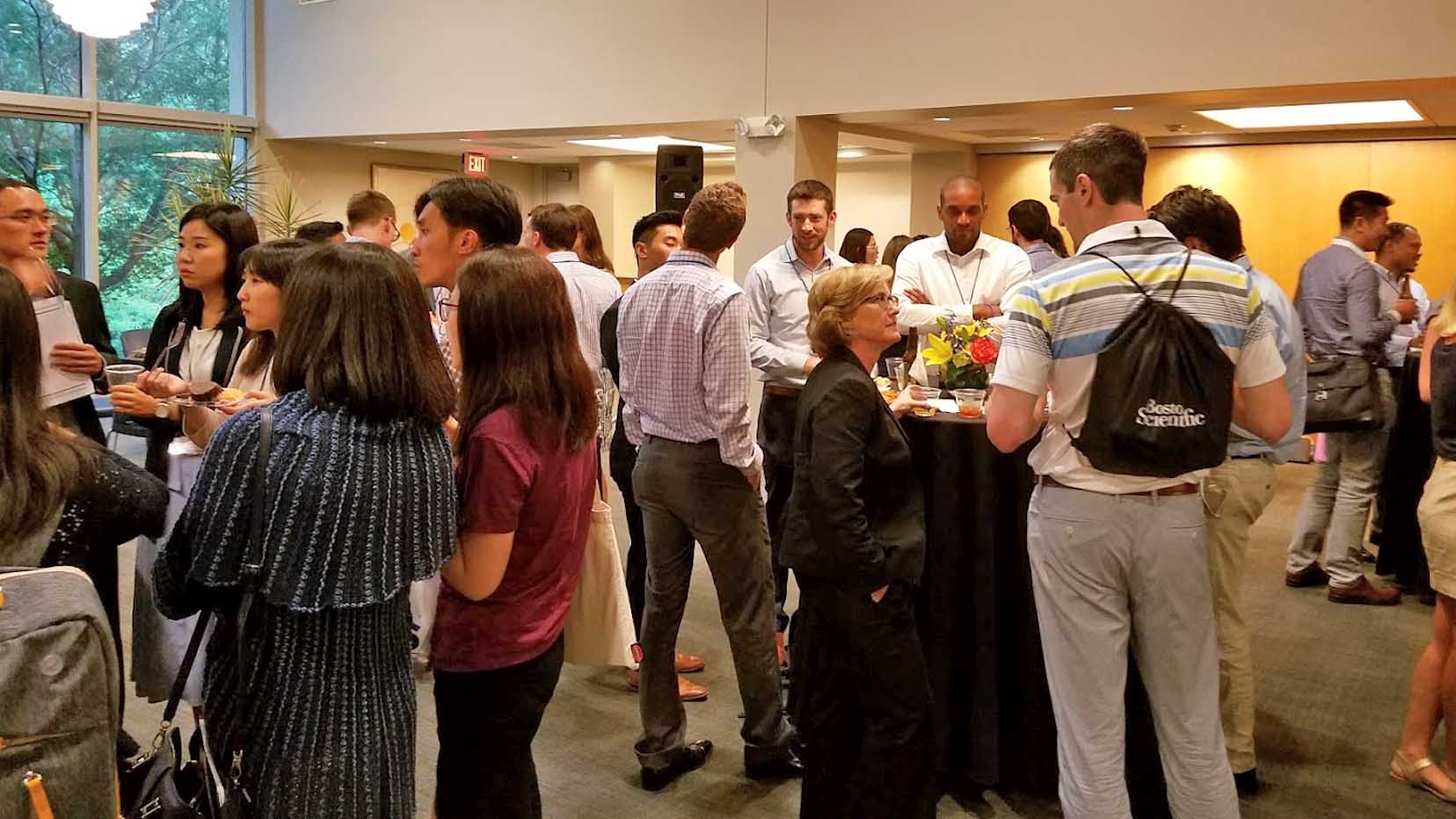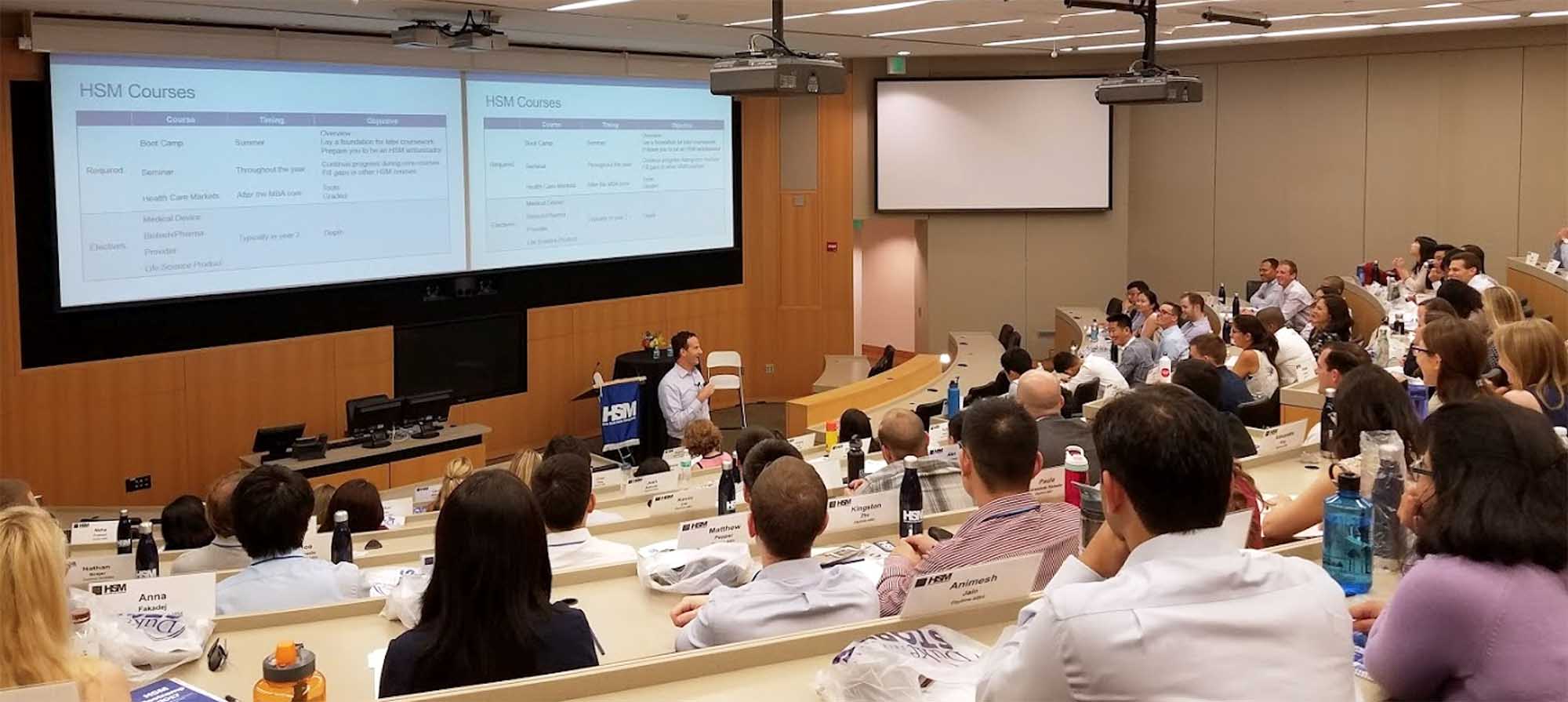Duke Global Executive MBA Student Blog

Gaining a Unique Health Care Perspective at HSM Bootcamp
Every year, the Duke Health Sector Management (HSM) program hosts Bootcamp, a week-long intensive course for Daytime and Executive MBA students. During this week, current and future health care leaders receive a comprehensive overview of the industry, from providers to insurers, to medical devices to innovation and venture capital

This blog was written prior to the Cross Continent MBA program merger with the Global Executive MBA program.
Every year, the Duke Health Sector Management (HSM) program hosts Bootcamp, a week-long intensive course for Daytime and Executive MBA students. During this week, current and future health care leaders receive a comprehensive overview of the industry, from providers to insurers, to medical devices to innovation and venture capital. HSM Bootcamp includes lectures, corporate sponsors, case practices, industry expert speakers, and culminates in a consulting team assignment. By the end of the program, an HSM student can expect to walk away with a unique understanding of the U.S. health care industry, valuable contacts with corporate sponsors and thought leaders, and many like-minded colleagues and friends.
Corporate Sponsors
Highlights of the week include the numerous corporate sponsor lunches, dinners, and case practices scattered throughout the curriculum. During HSM Bootcamp, we dined with Boston Scientific and Becton Dickinson (BD), attended receptions with Johnson & Johnson and Optum, and conducted case studies with Amgen and Medtronic.

Key Takeaways:
- The medical device industry has had to adjust to the value-based trend in health care. Companies are now required to justify each new product based on the value it provides, as well as look for new investments in growth areas. Key growth areas include venous, aortic, neuromodulation, Deep Brain Stimulation (DBS) and many others. An example of a corporation’s push into a new frontier is Medtronic’s device for DBS in Parkinson’s patients.
- Health care is inundated with problems. Big data provides potential solutions to those problems. However, big data is not the answer to everything, it’s a foundational element to the solutions. Currently, the industry utilizes big data to respond to the question “What is the status of our current patient population?” For example, where are the gaps in our care processes? Who will have a readmission or incidence? How can we take care of our existing community better? In the future, with the help of artificial intelligence and machine learning, big data analytics will be able to predict and provide relevant, easy to digest, immediately applicable insights into treatment and advice.
- The health care industry is chalk full of innovation, particularly within technology and emerging markets. A way to encourage innovation is through the pull and push mechanism. How can we, as a system, decrease costs of innovation (push mechanism), and increase reward (pull mechanism)? An example is Johnson & Johnson’s innovative initiative with JLab, an incubator for health care startups, and its commitment to providing innovations to push patient care.
Academics
Bootcamp attendees are provided a critical understanding of the health care industry through academic lectures from top researchers and scientists. The overview provides Duke HSM students a beneficial ‘leg up’ within the health care profession.

Key Takeaways:
- Medical care is similar all over the developing world. ‘Western’ approach to health care is the same. What is different is how each country pays for medical care.
- A nation’s health care system reflects the country’s history, politics, economy, and national views. There is no correct system. Every system has a tradeoff.
- A common thread within health care is the increasing costs, and how its leaders can impact the system, manage the high costs, and decrease wasteful spending.
Guest Speakers
The relevant academic topics of the Bootcamp curriculum are bolstered by in-depth viewpoints from thought leaders and industry experts living and breathing and shaping the concepts. Thought leaders range from a variety of professions such as White House economists, physicians, medical device executives, population health experts, venture capitalists, and entrepreneurs in the health care space.
Key Takeaways:
- Health care is unique. It’s characterized by a sizable public sector involvement, an uncertain impact of technological intervention, and an importance of human interaction and judgment. It’s important to realize that technology and human interaction do not always substitute one another. When we adopt a new technology, we require more labor and people for the adoption of the device.
- There is a large challenge for the implementation of technology. End users of technology don’t always use the product as it’s intended, resulting in unexpected benefits and costs.
- The industry is at a precipice for change. Keep an eye on the following pioneers:
- Blue Cross Blue Shield: telemedicine for doctor appointments
- Medwand: measures vital and basic
- CrowdMed: crowdsourcing diagnostics
- Practice Fusion: cloud-based electronic health record
- Blockchain
Team Assignment
The whirlwind week culminates in a group assignment. HSM students are assigned to a team of diverse and experienced current and future health care leaders. Within the Executive MBA class, we boast a neurosurgeon, eye surgeon, pediatrician, anesthesiologist, health care policy professional, consultants, medical device marketers, pharmaceutical executives, and health care administration professionals. The team project is to provide an analysis and recommendations for cost-cutting opportunities for several different health care corporations.

HSM Bootcamp taught us that health care is an incredibly complex and fascinating animal. It consists of multiple sectors and stakeholders, with conflicting incentives, mindsets, standards of processes, and cultures. Bootcamp provides a definite advantage for students to explore the kaleidoscope of sectors, network with current and future health care leaders, and gain first-hand insight on corporations.
An MBA advantage isn’t the ability to regurgitate buzzwords such as AI, Blockchain or Machine Learning. It’s to be able to think critically about where and how disruption will affect health care. A theme throughout the week is the idea of problems and solutions.
Professor Barack Richman asks, “If you hear of a problem, a gap, or a limitation, what do you do in business school?” The answer: “You fix them.” Throughout your time as a student at Duke, keep an eye and an ear out for problems and gaps. What currently exists does not have to continue to exist. As a member of the Duke community, we are provided the resources, the knowledge, the insights, and the critical thinking to change our world, and change our system. If anyone is going to help fix the U.S. health care system, it will be the business leaders, the entrepreneurs, and the innovators among us.
As Professor Ronnie Chatterji states, “Learn old war stories of what you can’t do. But learn new war stories of what you can.”



